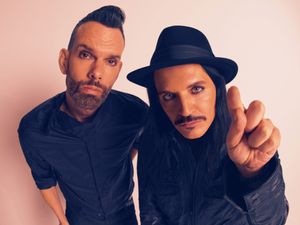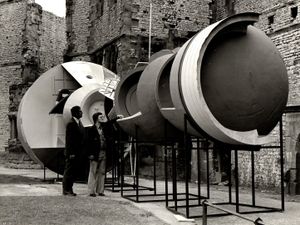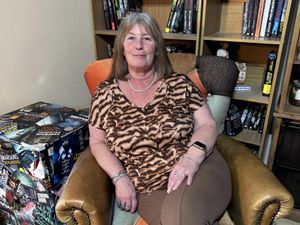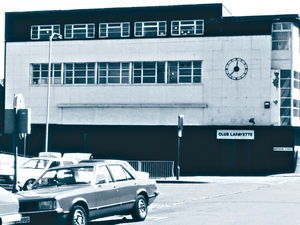Placebo: ‘Touring is like slipping into an old shoe’
After nearly a decade since they last released an album, Placebo returned in April with the acclaimed Never Let Me Go, their eighth studio album and first as a duo after the departure of drummer Steve Forrest in 2015. Never Let Me Go became their highest charting album debuting at No.3 in the UK and No.1 across multiple countries worldwide.

The band – Brian Molko and Stefan Olsdal – stood out a mile when they broke through a mid-90s music scene dominated by lad culture and class wars, offering an alternative that didn’t shy away from topics such as sexuality, gender and mental health.
After releasing seven albums that were never anything less than interesting and collaborating with heroes like David Bowie and Michael Stipe, Placebo became more of a live act, still keeping busy with both regular tours and activism, but fans hoping for new music were kept waiting for even longer than anyone had anticipated.
For frontman Brian, it was a relief to finally get it out there; Brian’s partner Stefan is in much the same headspace, but more than anything, he’s massively proud of what they have achieved with the new album.
He said: “The record’s out and it’s time to go again, you know, so I’m starting to get excited. I feel that we had the time to make the record that we really wanted to make this time around, considering it’s been eight years plus since the last record.
“So coming out of this whole strange period was a bit of a shock to the system, but now it feels like we have some beautiful songs that we can take on the road. That’s what I’m starting to feel now. So I’m in a good place.”
Anyone listening to the album and its lyrics would agree it feels like a perfect record to be coming out after all that the world had been through in the last couple of years, but Brian insists the bulk of it was written before everything really went south.
He said: “How does this record kind of reflect what’s happening in the world today? Well, I think the insecurity, the paranoia, all kinds of the tragedy, the inequality, you know, that we started to see everywhere. All that pain and desperation kind of influenced the record in terms of atmosphere.
“But I’d say that about 85% of the lyrics were written before Covid hit. Lyrically, it was important for me not to make a record about the plague. I think it would just have dated everything just phenomenally from the start. Sometimes it’s just about making records and it’s just whatever you do, so don’t try and be fashionable, because by the time you’ve finished your record, fashion will have changed and you’ll be unfashionable.
“You’ll have a longer career if you just stick to what you do and accept the fact that you’re going to be unfashionable for most of it.
“That’s how most of us have managed to achieve longevity; from Depeche Mode to The Cure to us, it’s kind of sticking to a kind of a singular vision.”
While the album is very much not a lockdown album, that period of enforced time off still had a big impact on both the music and the band themselves.
Stefan said: “In terms of this record, I think it’s served us well, really, because albeit it was frustrating the stop/start, now everything is okay you can do whatever you want, you can go here, you can do that, you can see each other face to face and you can work together in a studio.
“Then all of a sudden you couldn’t again. So the stop/start was a bit frustrating in terms of planning, but at the same time, it gave me and Brian time to digest what we’d done and also to work on ideas individually, take stuff away and work on it, make it evolve lyrically and musically so when we came back together, we’d had a chance to really explore each composition and also explore which compositions and which songs felt right for this period in our lives.”
The return of Placebo was always going to be welcomed by their huge and fiercely-loyal fanbase.
During lockdown Brian had his doubts, but it also gave him time to really consider his position as an artist and what that actually means.
He said: “I think that we’re extremely fortunate because after 27, 28 years, we still have fans and we still have an audience and for me, that was one of the things that I got so insecure about during lockdown, because for the first time in my life, the possibility of there not being an audience there and even the possibility of us not playing concerts again seemed real.
“That was something that I always depended on, as no matter how messed up your life gets, or how many disasters happen in a row, there’ll always be an audience for you to go and do a show, but that was taken away during lockdown.
“All of a sudden I started asking myself questions that I’ve never asked myself before in my career, like, ‘do I have a future?’
“For me, it was evident to me before lockdown that, of course, we’d always have a future. Look, we’re still around. So many bands that started at the same time as us, they aren’t still around, as they quit or the audience went away. So we’re in an extremely privileged position, I think.
“But I’m not about to pretend that just because we’ve achieved some kind of longevity, that we are superior artistically. Michael Bublé’s achieved longevity. So has Barry Manilow. So I never know if what I do is of artistic value because I question it continuously.”
With the album out, the band have also got that other thing they were missing so much coming up, as they have a full touring schedule booked that will see them back on UK stages in November.
For Brian, it’s something he can’t wait for, but it comes with no small amount of trepidation too.
He said: “I desperately want to go out and do what I’m best at, but also because we’ve had such a break I’m nervous about it. I don’t think I would have been nervous if we hadn’t have had this enforced two-year break, but because we had this pause and we lost momentum, it’s become less automatic.
“I didn’t think about shows before. Now I think about every aspect of it.
“I agonised and agonised for months over my pedal board, for example. So I’m excited, but I think it’s going to be a major culture shock even though we’ve got 25 years of playing live behind us.
“It’s like slipping into an old shoe that doesn’t feel the same or that you didn’t expect it to feel like, but you will get used to it again.”





